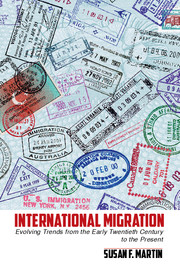Book contents
- Frontmatter
- Contents
- Foreword
- Acknowledgments
- List of Acronyms
- Introduction
- 1 Early Roots
- 2 “The Problem of Refugees”
- 3 Labor Mobility
- 4 Orderly and Humane Migration Management
- 5 Trafficking in Persons
- 6 Migration and International Security
- 7 Migration, the Environment, and Climate Change*
- 8 Migration and Development
- 9 Towards the Future
- Bibliography
- Index
5 - Trafficking in Persons
Published online by Cambridge University Press: 05 August 2014
- Frontmatter
- Contents
- Foreword
- Acknowledgments
- List of Acronyms
- Introduction
- 1 Early Roots
- 2 “The Problem of Refugees”
- 3 Labor Mobility
- 4 Orderly and Humane Migration Management
- 5 Trafficking in Persons
- 6 Migration and International Security
- 7 Migration, the Environment, and Climate Change*
- 8 Migration and Development
- 9 Towards the Future
- Bibliography
- Index
Summary
In recent years, trafficking of people for sexual exploitation and forced labor has become one of the fastest growing areas of international criminal activity and one that is of increasing concern to the international community. Great growth has also been seen in the smuggling of people across borders in defiance of immigration and criminal laws enacted by source, transit, and receiving countries. While international law treats the two issues separately, there are many interconnections between smuggling and trafficking, particularly when would-be migrants go into debt bondage in order to pay smuggling fees. Chapter 6 discusses smuggling in greater detail.
The attention to human trafficking is by no means new. In the nineteenth century, the term “white slavery” was used to describe trafficking in women for prostitution. This chapter begins with historical background information and then turns to the current conceptualization of trafficking in persons and its connection to human smuggling. Both human smuggling and human trafficking, as currently defined, involve illegal movements of people, but human smuggling does not require the coercion, deception, or exploitation that is part of the definition of trafficking. In human smuggling contexts, the migrant enters voluntarily into a monetary arrangement with the smuggler to be transported across an international border. In effect, the smuggled migrant is complicit in his or her own smuggling and the commission of the criminal offense, whereas the trafficked person is the victim of a criminal operation. In some cases, however, smuggling can turn into trafficking, particularly when a migrant is forced into bondage in order to pay off the smuggling fees. If the migrant was not told what would be required to repay the fees, and has no control over his or her labor after entry, then such debt bondage may meet the trafficking definition since the migrant was deceived into entering into an exploitative situation.
- Type
- Chapter
- Information
- International MigrationEvolving Trends from the Early Twentieth Century to the Present, pp. 154 - 181Publisher: Cambridge University PressPrint publication year: 2014



